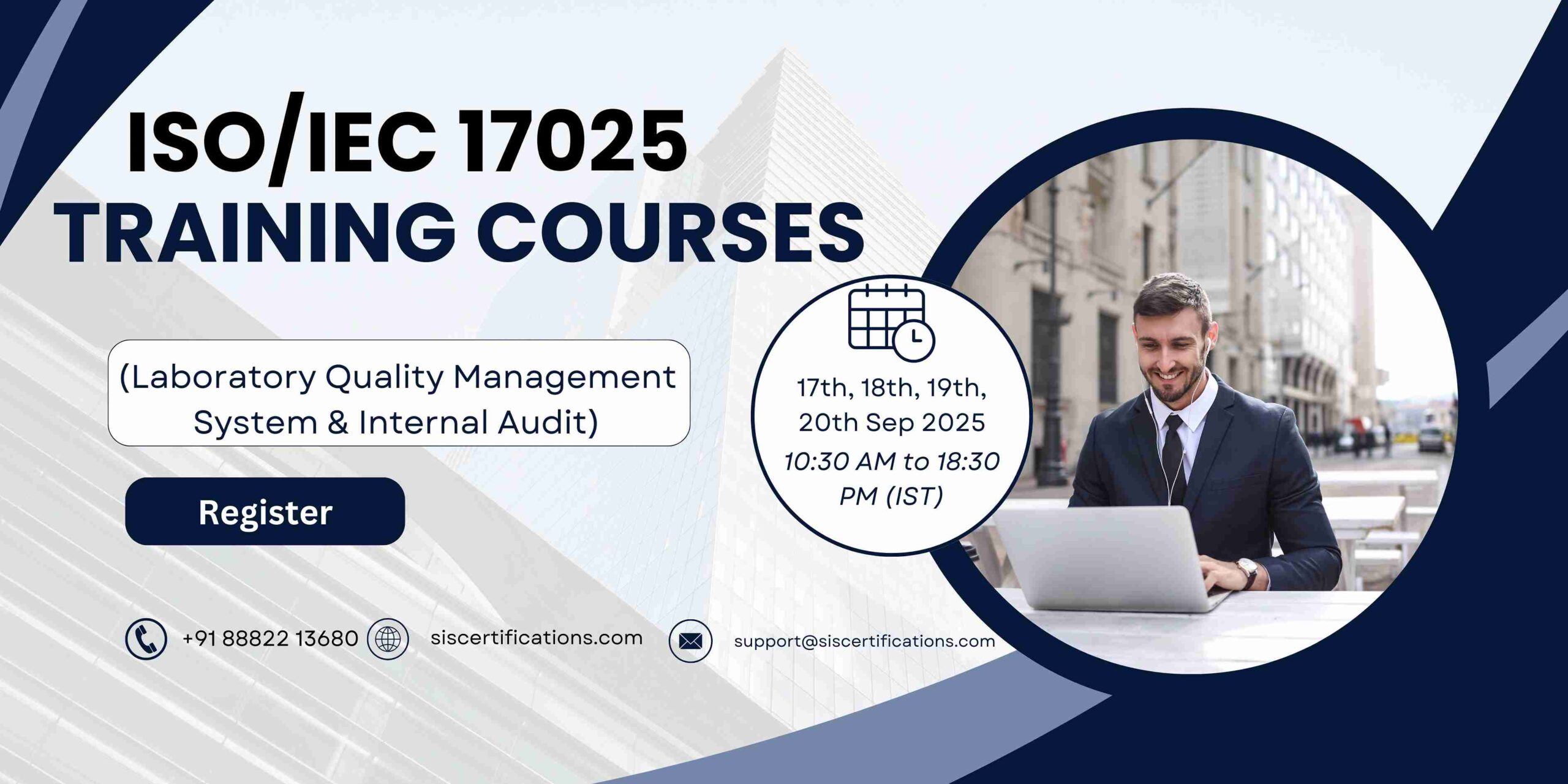Mastering Laboratory Quality Management System & Internal Audit as per ISO/IEC 17025:2017

Mastering Laboratory Quality Management System & Internal Audit as per ISO/IEC 17025:2017
In the realm of testing and calibration laboratories, ensuring precision, reliability, and compliance with global standards is paramount. ISO/IEC 17025:2017 is the cornerstone for laboratories striving to demonstrate technical competence and produce consistent, accurate results. This internationally recognized standard outlines requirements for a robust Laboratory Quality Management System (LQMS) and mandates internal audits to maintain compliance and drive improvement. Whether you’re in pharmaceuticals, environmental testing, or material analysis, aligning with ISO/IEC 17025:2017 enhances credibility and opens doors to global opportunities.
Internal audits, a critical requirement of the standard, serve as a proactive tool to evaluate system effectiveness, identify gaps, and ensure ongoing adherence to quality benchmarks. For laboratories aiming for accreditation or seeking to refine their processes, understanding these components is essential. This blog explores the intricacies of LQMS, the role of internal audits, and the importance of ISO/IEC 17025 Training Courses in equipping professionals to excel in this framework. Read on to discover how labs can achieve operational excellence and maintain a competitive edge.
Overview of Laboratory Quality Management System
A Laboratory Quality Management System (LQMS) is a structured framework that ensures laboratories operate efficiently, deliver reliable results, and comply with ISO/IEC 17025:2017. This standard, revised in 2017, specifies requirements for both management and technical operations, focusing on competence, impartiality, and consistent performance. An LQMS integrates policies, processes, and resources to meet customer expectations and regulatory demands, making it indispensable for accredited labs.
Key elements of an LQMS include documented procedures for sample handling, equipment maintenance, method validation, and result reporting. Labs must establish policies to ensure impartiality and confidentiality while addressing risks and opportunities through a risk-based approach introduced in the 2017 update. For example, traceability of measurements to international standards is critical to ensure results are globally comparable, enhancing trust in lab outputs.
Implementing an LQMS requires a clear organizational structure, competent personnel, and adequate facilities. Clause 6 of the standard covers resource requirements, such as trained staff and calibrated equipment, while Clause 7 addresses technical processes like test method selection. Clause 8 offers flexibility in management system options, allowing labs to align with ISO 9001 or develop a tailored system.
The benefits are significant: an LQMS boosts customer confidence, streamlines operations, and supports accreditation, which is often a prerequisite in regulated industries like food safety or medical diagnostics. Labs embarking on this journey can leverage ISO/IEC 17025 Training Courses to gain practical insights into building and maintaining an effective LQMS, ensuring compliance and fostering a culture of quality.
Ultimately, an LQMS transforms laboratories into reliable hubs of scientific excellence, delivering results that stakeholders can trust while positioning the lab for long-term success.
What is Internal Audit as per ISO/IEC 17025:2017
Internal audits, as mandated by Clause 8.8 of ISO/IEC 17025:2017, are systematic evaluations of a laboratory’s quality management system to ensure it meets the standard’s requirements and the lab’s own policies. These audits are essential for verifying that processes, from sample analysis to reporting, are performed competently and consistently, while identifying areas for improvement.
Conducted by trained, impartial auditors, internal audits involve reviewing documents, observing operations, interviewing staff, and checking records. For instance, auditors might assess whether calibration records are current or if non-conforming work is addressed per established procedures. The process includes planning the audit scope, collecting evidence, reporting findings, and following up on corrective actions to address non-conformities.
Audits must be planned at regular intervals, typically annually, based on the lab’s risk profile and previous audit outcomes. The goal is to cover all aspects of the management system over time, ensuring comprehensive oversight. Findings, including strengths and weaknesses, are documented, and non-conformities trigger root cause analysis and corrective measures to prevent recurrence.
Beyond compliance, internal audits drive efficiency by highlighting bottlenecks or outdated practices. For labs seeking accreditation, robust audits signal readiness to external assessors. ISO/IEC 17025 Training Courses tailored to auditing provide practical skills, such as developing checklists or conducting risk-based audits, empowering auditors to add value to the lab’s operations.
In short, internal audits are a proactive mechanism to maintain quality, ensure compliance, and foster continuous improvement, making them a cornerstone of ISO/IEC 17025:2017.
Why is there a need for ISO Training?
ISO/IEC 17025 Training Courses are vital for laboratories to successfully implement and sustain compliance with the standard. The complexity of ISO/IEC 17025:2017, with its technical and managerial requirements, demands a deep understanding of its clauses, from risk management to measurement uncertainty. Training bridges this knowledge gap, equipping personnel with the tools to excel.
One key reason for training is to ensure staff competence. The standard requires that all personnel involved in testing, calibration, or quality management are adequately trained. Courses cover critical areas like method validation, equipment calibration, and impartiality, reducing errors and enhancing result reliability. For internal auditors, training hones skills in audit planning, evidence collection, and non-conformity resolution.
Training also aligns labs with the 2017 updates, such as the emphasis on risk-based thinking and decision rules for conformity. Without this knowledge, labs risk non-compliance, which can jeopardize accreditation or client trust. Additionally, training fosters a quality-driven culture, encouraging staff to proactively identify risks and contribute to system improvements.
From a business perspective, investing in ISO/IEC 17025 Training Courses yields cost savings by minimizing rework, enhancing efficiency, and strengthening market reputation. Accreditation bodies often scrutinize training records during assessments, making documented competence a compliance necessity.
In essence, training empowers lab professionals to navigate the standard’s complexities, ensuring operational excellence and positioning the lab as a trusted leader in its field.
Principles of ISO Certification
ISO/IEC 17025:2017 certification (or accreditation, as it’s often termed for labs) is built on principles that ensure quality, competence, and reliability. These principles align with broader ISO standards but are tailored to the unique needs of testing and calibration laboratories.
Customer focus drives labs to meet client expectations through accurate, timely results and transparent communication. Leadership ensures top management champions quality, allocates resources, and upholds impartiality. The engagement of people emphasizes training and empowering staff to contribute to system effectiveness.
The process approach integrates lab activities, from sample receipt to reporting, into a cohesive system for consistent outcomes. Improvement is ongoing, using audits and reviews to address risks and enhance performance. Evidence-based decision making relies on data, such as proficiency testing results, to guide actions.
Relationship management extends to external partners, ensuring suppliers meet quality requirements, such as providing traceable calibration services. Labs must also prioritize technical principles like measurement traceability and transparency in processes to validate results.
Achieving accreditation requires demonstrating these principles through documented processes and competent practices, often supported by ISO/IEC 17025 Training Courses. These principles ensure labs not only meet standards but also deliver value to stakeholders.
FAQs
What does ISO/IEC 17025:2017 cover?
It specifies requirements for lab competence in testing and calibration, including quality management and technical operations.
Why are internal audits important?
They verify compliance, assess system effectiveness, and identify improvement opportunities, as required by Clause 8.8.
Who benefits from ISO/IEC 17025 Training Courses?
Lab managers, technicians, quality personnel, and auditors gain skills to implement and audit the standard effectively.
How frequently should audits occur?
At planned intervals, typically annually, based on risk and system needs.
What challenges arise in ISO/IEC 17025 implementation?
Common issues include documentation, resource constraints, and staff training, mitigated through structured training programs.
How does ISO/IEC 17025 relate to ISO 9001?
It incorporates ISO 9001’s quality principles but adds lab-specific technical requirements.
Is accreditation the same as certification?
Accreditation verifies technical competence under ISO/IEC 17025, while certification typically applies to management systems.
Conclusion
A robust Laboratory Quality Management System and diligent internal audits are vital for laboratories to meet ISO/IEC 17025:2017 requirements and achieve operational excellence. By embracing the standard’s principles and investing in ISO/IEC 17025 Training Courses, labs can ensure compliance, enhance reliability, and build trust with clients. These efforts not only support accreditation but also position labs as leaders in precision and quality. Take the next step by equipping your team with the knowledge to thrive in a competitive, regulated landscape.







Leave a Comment